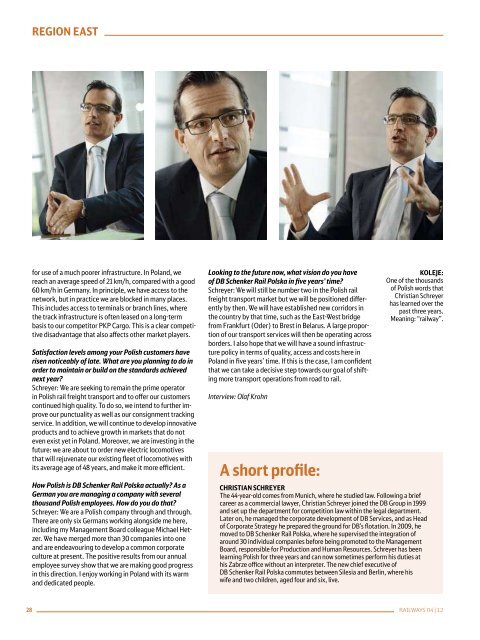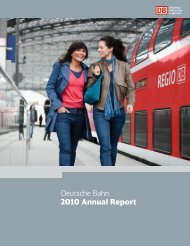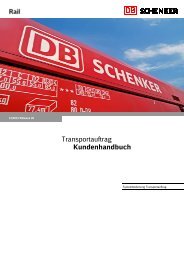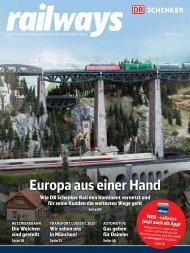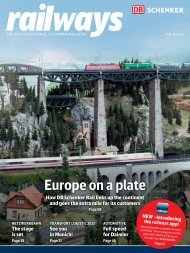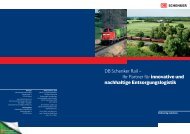PDF Download - Nord Cargo
PDF Download - Nord Cargo
PDF Download - Nord Cargo
You also want an ePaper? Increase the reach of your titles
YUMPU automatically turns print PDFs into web optimized ePapers that Google loves.
Region East<br />
MILESTONE:<br />
Marmaray will create<br />
the first land-based<br />
rail connection between<br />
the European<br />
and Asian parts of<br />
Turkey. By day, the<br />
tunnel is expected<br />
to be used mainly for<br />
passenger trains.<br />
for use of a much poorer infrastructure. In Poland, we<br />
reach an average speed of 21 km/h, compared with a good<br />
60 km/h in Germany. In principle, we have access to the<br />
network, but in practice we are blocked in many places.<br />
This includes access to terminals or branch lines, where<br />
the track infrastructure is often leased on a long-term<br />
basis to our competitor PKP <strong>Cargo</strong>. This is a clear competitive<br />
disadvantage that also affects other market players.<br />
Satisfaction levels among your Polish customers have<br />
risen noticeably of late. What are you planning to do in<br />
order to maintain or build on the standards achieved<br />
next year?<br />
Schreyer: We are seeking to remain the prime operator<br />
in Polish rail freight transport and to offer our customers<br />
continued high quality. To do so, we intend to further improve<br />
our punctuality as well as our consignment tracking<br />
service. In addition, we will continue to develop innovative<br />
products and to achieve growth in markets that do not<br />
even exist yet in Poland. Moreover, we are investing in the<br />
future: we are about to order new electric locomotives<br />
that will rejuvenate our existing fleet of locomotives with<br />
its average age of 48 years, and make it more efficient.<br />
How Polish is DB Schenker Rail Polska actually? As a<br />
German you are managing a company with several<br />
thousand Polish employees. How do you do that?<br />
Schreyer: We are a Polish company through and through.<br />
There are only six Germans working alongside me here,<br />
including my Management Board colleague Michael Hetzer.<br />
We have merged more than 30 companies into one<br />
and are endeavouring to develop a common corporate<br />
culture at present. The positive results from our annual<br />
employee survey show that we are making good progress<br />
in this direction. I enjoy working in Poland with its warm<br />
and dedicated people.<br />
Looking to the future now, what vision do you have<br />
of DB Schenker Rail Polska in five years’ time?<br />
Schreyer: We will still be number two in the Polish rail<br />
freight transport market but we will be positioned differently<br />
by then. We will have established new corridors in<br />
the country by that time, such as the East-West bridge<br />
from Frankfurt (Oder) to Brest in Belarus. A large proportion<br />
of our transport services will then be operating across<br />
borders. I also hope that we will have a sound infrastructure<br />
policy in terms of quality, access and costs here in<br />
Poland in five years’ time. If this is the case, I am confident<br />
that we can take a decisive step towards our goal of shifting<br />
more transport operations from road to rail.<br />
Interview: Olaf Krohn<br />
A short profile:<br />
KOLEJE:<br />
One of the thousands<br />
of Polish words that<br />
Christian Schreyer<br />
has learned over the<br />
past three years.<br />
Meaning: “railway”.<br />
Christian Schreyer<br />
The 44-year-old comes from Munich, where he studied law. Following a brief<br />
career as a commercial lawyer, Christian Schreyer joined the DB Group in 1999<br />
and set up the department for competition law within the legal department.<br />
Later on, he managed the corporate development of DB Services, and as Head<br />
of Corporate Strategy he prepared the ground for DB’s flotation. In 2009, he<br />
moved to DB Schenker Rail Polska, where he supervised the integration of<br />
around 30 individual companies before being promoted to the Management<br />
Board, responsible for Production and Human Resources. Schreyer has been<br />
learning Polish for three years and can now sometimes perform his duties at<br />
his Zabrze office without an interpreter. The new chief executive of<br />
DB Schenker Rail Polska commutes between Silesia and Berlin, where his<br />
wife and two children, aged four and six, live.<br />
Photos: Max Lautenschläger (3); Corbis; Map: Ole Utikal<br />
Turkey, market of the future:<br />
the Marmaray project<br />
The first rail connection between Europe and Anatolia is expected<br />
to open in 2013. This tunnel under the Strait of Bosporus will also<br />
blaze new trails for freight traffic.<br />
In European eyes, Turkey is not yet a priority for<br />
rail freight traffic. But Andreas Lipka, for one, is<br />
sure that this is going to change. “Turkey is already<br />
a regional economic power, and it will close the<br />
decisive gap in the rail infrastructure at the Bosporus,”<br />
says Lipka, Head of European Service Design in Eastern<br />
Europe at DB Schenker Rail.<br />
Marmaray is expected to be completed in 2013. This<br />
project, its name a combination of the Sea of Marmara<br />
and the Turkish word ray (rail), is the first direct rail<br />
connection between Europe and Anatolia. A 13.6-<br />
kilometre-long rail tunnel will pass under the Bosporus,<br />
56 metres below sea level. For the first time,<br />
this €2.5-billion tube will give the metropolis of Istanbul,<br />
with its population of 13 million, an effective suburban<br />
rail system connecting its districts on the<br />
European and Asian sides of the strait. Long-distance<br />
and freight trains are also expected to pass through<br />
the earthquake-proof tunnel.<br />
“It is true that DB is already running a few trains<br />
to Turkey each week for the automotive industry, for<br />
example,” Andreas Lipka says. “However, the opening<br />
of Marmaray will result in entirely new prospects in<br />
the southeast for us. We are getting ready for this right<br />
now.” The Turkish state railway has been redeveloping<br />
its infrastructure for several years now to ensure<br />
that it can meet the present and future requirements<br />
of the logistics market. Marmaray is expected to replace<br />
the existing rail ferry across the Bosporus.<br />
This will make it possible to run direct freight trains<br />
from Central Europe to Asia Minor – and, in future,<br />
onward to the Middle East. Marmaray will give a completely<br />
new impetus to this freight corridor from Europe<br />
to Asia Minor that has largely remained untapped<br />
until now.<br />
ok<br />
Breakthrough at the Bosporus<br />
Europe<br />
Istanbul<br />
Marmaray Tunnel<br />
(under construction)<br />
Sea of Marmara<br />
Bosporus<br />
Asia<br />
Over the tunnel, the Bosporus is only 1,400 metres wide<br />
– but almost 50 metres deep. This requires long subterranean<br />
ramps west and east of the strait.<br />
28 Railways 04 | 12<br />
29


